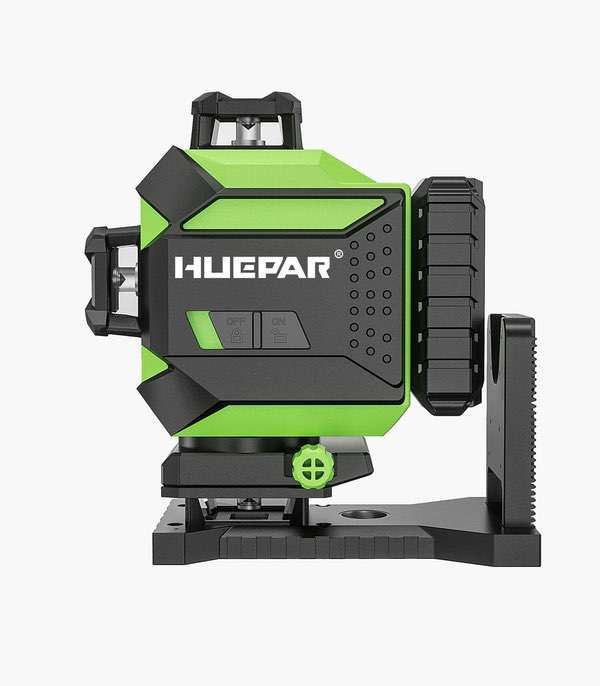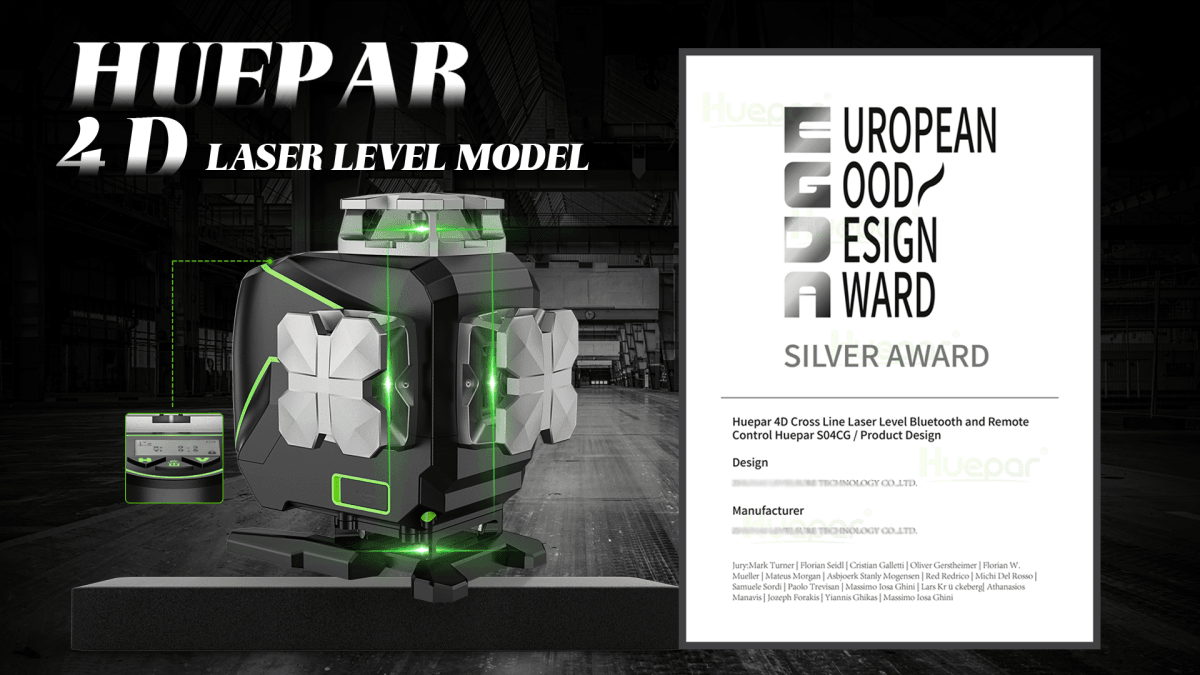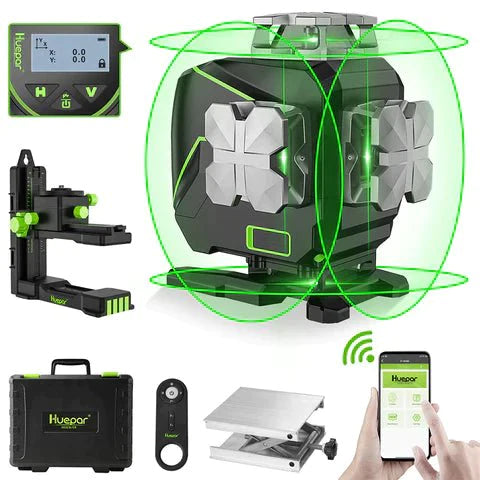Introduction to Laser Levels
What is a Laser Level?
A laser level is a control tool. It emits a laser beam to mark a straight line. This tool helps in aligning and placing objects with great precision. It replaces traditional levels like spirit levels. Laser levels work well over larger areas. They are a key tool for construction and home projects. Their use makes tasks faster, easier, and more accurate.

Types of Laser Levels
Laser levels come in different forms, each suitable for specific tasks. The main types include:
- Dot Lasers: These project simple dots on surfaces. They work well for transfer points up and down like from the floor to the ceiling.
- Line Lasers: Also known as cross-line lasers, they emit straight lines along the surface. Perfect for aligning work like tiling or cabinets.
- Rotary Lasers: These create a 360-degree line around the room. They are ideal for outdoor use or in large spaces.
- 3D Laser Levels: These advanced tools project lines in three dimensions. They help with precise layout tasks.
Each type has its own advantages and scenarios where it outperforms others. Understanding these will guide you in selecting the right laser level for your project.
Why Use a 3D Laser Level?
Using a 3D laser level has a host of benefits that make it an indispensable tool for professionals and DIY enthusiasts alike. Unlike traditional spirit levels, which only offer a single plane of reference, 3d laser levels project lines on all three axes: horizontal, vertical, and depth. This three-dimensional approach ensures accurate and comprehensive alignment for complex setups and installations. For tasks like tiling, carpentry, or installing cabinets, a 3D laser level ensures that each element is perfectly aligned, saving time and preventing costly errors. With their ability to provide clear, bright lines visible even in well-lit areas, 3D laser levels boost efficiency and precision for any project.
Key Features of 3D Laser Levels
Accuracy and Precision
3d laser levels are sought after due to their supreme accuracy and precision. These levels can project lines within hairline accuracy, often up to 1/16th of an inch over a distance of 100 feet. The precision ensures that whether you're hanging cabinets or installing complex frameworks, each alignment is exact. For professionals who demand rigor in their work, the high precision of a 3D laser level is invaluable. This exactness not only saves time but also reduces costly mistakes during construction or renovation projects.
Range and Visibility
Range and visibility are crucial in 3d laser levels. They determine how far and clear the laser line can be seen. Good range lets you work on large sites without trouble. Bright lasers give better visibility in all light. Look for models with a range that suits your project size. Also, get one with bright beams for clear lines, even in daylight. Some levels offer a pulse mode. This works with a detector for longer range use. Remember, more range and visibility up your work precision.
Self-Leveling Capabilities
One of the standout features of 3d laser levels is their self-leveling capabilities. This function enables the laser level to automatically find and maintain a level position within a specified range of degrees, usually indicated by the manufacturer. As a result, it significantly reduces set up time and enhances accuracy. Users enjoy the convenience of not having to manually adjust the device to achieve a straight line. This feature is particularly helpful in construction and renovation projects where precision is key. Most modern 3D laser levels are equipped with visual and audible indicators that alert the user when the device goes beyond its leveling range, ensuring consistent accuracy throughout the job.
Durability and Battery Life
Durability and battery life are vital when picking a 3D laser level. Solid build quality ensures your tool withstands job site hazards. A robust design can handle drops and dust without damage. This means less downtime and more reliable work. Battery life is just as crucial. Look for models with long-lasting power to avoid frequent charging. Some laser levels even offer replaceable batteries. This lets you carry spares and keep working without a break. Always check the IP rating to gauge toughness against water and debris. A higher IP rating implies better protection. For long jobs, a durable laser level with good battery life is a smart choice.
Choosing the Right Laser Level
Understanding the Difference: 3D vs. 4D Laser Levels
While picking a laser level, you may find terms like 3D and 4D. They aren't the same. 3d laser levels cast lines on the X, Y, and Z axes. These are good for tasks that need 360-degree coverage. 4D laser levels, on the other hand, have an extra line. This allows for more complex layouts. You'll see 4D lasers in more advanced projects. They are best for jobs needing complete room layout. Knowing which you need is key for precise work.
Factors to Consider When Buying a 3D Laser Level
Before purchasing a 3D laser level, it's important to evaluate various factors:
- Accuracy: Look for precise and reliable models.
- Range: Choose a level with a sufficient working distance for your needs.
- Self-Leveling Feature: Opt for levels that offer self-leveling for easier setup.
- Durability: Select a sturdy device that can withstand tough site conditions.
- Battery Life: Consider how long the device can operate without needing a charge.
- Ease of Use: Prioritize user-friendly interfaces and features.
- Price Point: Balance cost versus features to find the best value.
- Brand Reputation: Research and choose brands known for quality.
Assessing these aspects will help ensure you pick a 3D laser level that's both effective and dependable for your tasks.
The Best Brands and Models for Cross Line Laser Level Tasks
When searching for the top cross line laser levels, it's vital to consider reputable brands known for quality and reliability. Some leading brands in the market include:
- DeWalt: Known for robust construction tools, DeWalt's laser levels offer accuracy and durability.
- Bosch: Bosch provides innovative technology with user-friendly features, ideal for both professionals and DIY enthusiasts.
- Spectra Precision: They deliver high-performance tools designed for demanding tasks with exceptional accuracy.
Aside from brand reputation, specific models stand out for cross line tasks. For instance, the DeWalt DW088K is praised for its clear visibility and accuracy. Meanwhile, the Bosch GLL 55 offers impressive range and self-leveling capabilities that make work efficient. Research and personal needs should guide your final decision to ensure you find the model best suited to your requirements.









